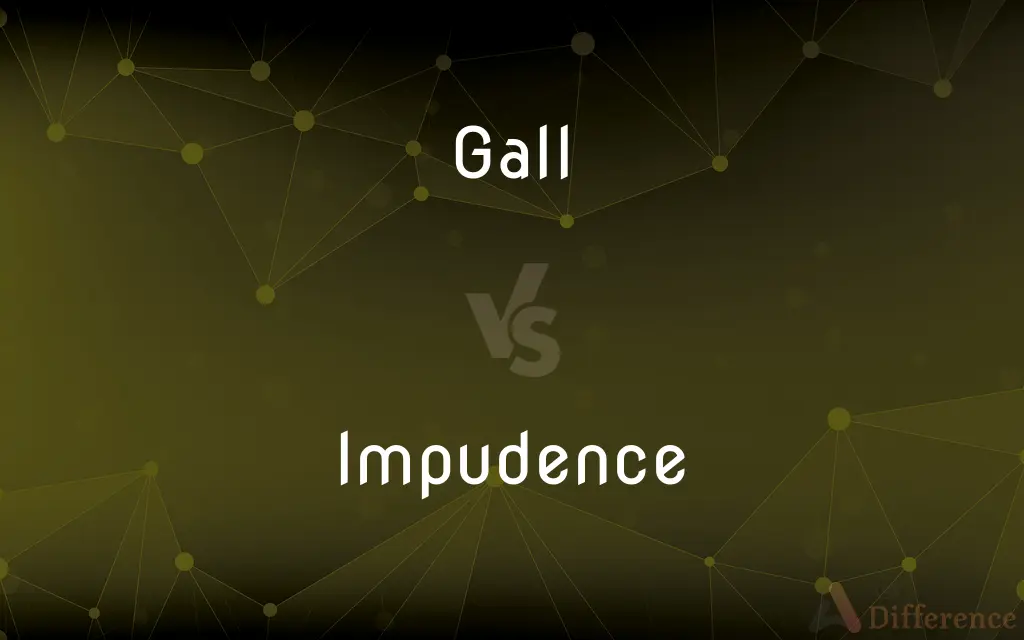Gall vs. Impudence — What's the Difference?

Difference Between Gall and Impudence
ADVERTISEMENT
Compare with Definitions
Gall
Galls (from Latin galla, 'oak-apple') or cecidia (from Greek kēkidion, anything gushing out) are a kind of swelling growth on the external tissues of plants, fungi, or animals. Plant galls are abnormal outgrowths of plant tissues, similar to benign tumors or warts in animals.
Impudence
The quality of being offensively bold.
Gall
Outrageous insolence; effrontery
After borrowing my car, he had the gall to complain about its seats.
Impudence
Offensively bold behavior.
Gall
Bitterness of feeling; rancor.
ADVERTISEMENT
Impudence
The quality of being impudent, not showing due respect.
Gall
Something bitter to endure
The gall of defeat.
Impudence
Impudent language, conduct or behavior.
Gall
See bile.
Impudence
The quality of being impudent; assurance, accompanied with a disregard of the presence or opinions of others; shamelessness; forwardness; lack of modesty.
Clear truths that their own evidence forces us to admit, or common experience makes it impudence to deny.
Where pride and impudence (in fashion knit)Usurp the chair of wit.
Gall
A skin sore caused by friction and abrasion
A saddle gall.
Impudence
An impudent statement
Gall
Exasperation; vexation.
Impudence
The trait of being rude and impertinent; inclined to take liberties
Gall
The cause of such vexation.
Gall
An abnormal growth of plant tissue caused by an organism, such as an insect, mite, or bacterium, or by a wound.
Gall
To irk or exasperate; vex
It galled me to have to wait outside.
Gall
To wear away or make sore by abrasion; chafe:
Gall
To become worn or sore by abrasion.
Gall
(anatomy) The gall bladder.
Gall
(uncountable) A feeling of exasperation.
Gall
(uncountable) Impudence or brazenness; temerity, chutzpah.
Gall
(countable) A sore on a horse caused by an ill-fitted or ill-adjusted saddle; a saddle sore.
Gall
(countable) A pit on a surface being cut caused by the friction between the two surfaces exceeding the bond of the material at a point.
Gall
Bile, especially that of an animal; the greenish, profoundly bitter-tasting fluid found in bile ducts and gall bladders, structures associated with the liver.
Gall
Great misery or physical suffering, likened to the bitterest-tasting of substances.
Gall
A sore or open wound caused by chafing, which may become infected, as with a blister.
Gall
A blister or tumor-like growth found on the surface of plants, caused by burrowing of insect larvae into the living tissues, especially that of the common oak gall wasp Cynips quercusfolii.
Gall
(countable) A bump-like imperfection resembling a gall.
Gall
(transitive) To bother or trouble.
Gall
To harass, to harry, often with the intent to cause injury.
Gall
To chafe, to rub or subject to friction; to create a sore on the skin.
Gall
To exasperate.
Gall
To cause pitting on a surface being cut from the friction between the two surfaces exceeding the bond of the material at a point.
Improper cooling and a dull milling blade on titanium can gall the surface.
Gall
To scoff; to jeer.
Gall
To impregnate with a decoction of gallnuts in dyeing.
Gall
The bitter, alkaline, viscid fluid found in the gall bladder, beneath the liver. It consists of the secretion of the liver, or bile, mixed with that of the mucous membrane of the gall bladder.
Gall
The gall bladder.
Gall
Anything extremely bitter; bitterness; rancor.
He hath . . . compassed me with gall and travail.
Comedy diverted without gall.
Gall
Impudence; brazen assurance.
Gall
An excrescence of any form produced on any part of a plant by insects or their larvae. They are most commonly caused by small Hymenoptera and Diptera which puncture the bark and lay their eggs in the wounds. The larvae live within the galls. Some galls are due to aphids, mites, etc. See Gallnut.
Gall
A wound in the skin made by rubbing.
Gall
To impregnate with a decoction of gallnuts.
Gall
To fret and wear away by friction; to hurt or break the skin of by rubbing; to chafe; to injure the surface of by attrition; as, a saddle galls the back of a horse; to gall a mast or a cable.
I am loth to gall a new-healed wound.
Gall
To fret; to vex; as, to be galled by sarcasm.
They that are most galled with my folly,They most must laugh.
Gall
To injure; to harass; to annoy; as, the troops were galled by the shot of the enemy.
In our wars against the French of old, we used to gall them with our longbows, at a greater distance than they could shoot their arrows.
Gall
To scoff; to jeer.
Gall
An open sore on the back of a horse caused by ill-fitting or badly adjusted saddle
Gall
A skin sore caused by chafing
Gall
Abnormal swelling of plant tissue caused by insects or microorganisms or injury
Gall
A feeling of deep and bitter anger and ill-will
Gall
A digestive juice secreted by the liver and stored in the gallbladder; aids in the digestion of fats
Gall
The trait of being rude and impertinent; inclined to take liberties
Gall
Become or make sore by or as if by rubbing
Gall
Irritate or vex;
It galls me that we lost the suit
Share Your Discovery

Previous Comparison
Gratifying vs. Satisfying
Next Comparison
Bliss vs. Love














































